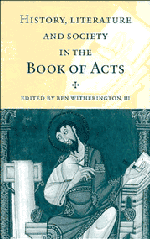Book contents
- Frontmatter
- Contents
- Preface
- PART I ISSUES OF GENRE AND HISTORICAL METHOD
- PART II HISTORICAL AND THEOLOGICAL DIFFICULTIES IN ACTS
- 6 Acts 6.1–8.4: division or diversity?
- 7 James and the Gentiles (Acts 15.13–21)
- 8 Kerygmatic summaries in the speeches of Acts
- 9 The “script” of the Scriptures in Acts: suffering as God's “plan” (βουλή) for the world for the “release of sins”
- 10 Luke's social location of Paul: cultural anthropology and the status of Paul in Acts
- PART III ISSUES OF LITERARY CRITICISM
- Index of biblical references
6 - Acts 6.1–8.4: division or diversity?
Published online by Cambridge University Press: 02 February 2010
- Frontmatter
- Contents
- Preface
- PART I ISSUES OF GENRE AND HISTORICAL METHOD
- PART II HISTORICAL AND THEOLOGICAL DIFFICULTIES IN ACTS
- 6 Acts 6.1–8.4: division or diversity?
- 7 James and the Gentiles (Acts 15.13–21)
- 8 Kerygmatic summaries in the speeches of Acts
- 9 The “script” of the Scriptures in Acts: suffering as God's “plan” (βουλή) for the world for the “release of sins”
- 10 Luke's social location of Paul: cultural anthropology and the status of Paul in Acts
- PART III ISSUES OF LITERARY CRITICISM
- Index of biblical references
Summary
Now in these days when the disciples were increasing in number, the Hellenists murmured against the Hebrews because their widows were neglected in the daily distribution.
Acts 6.1 (RSV)The predominant interpretation of Acts 6.1–8.4 holds that the “Hellenists” and “Hebrews” were separate, ideologically defined parties within the early Jerusalem church. The Hellenists, being universalistic in outlook and liberal in temperament, came after a short time to realize – in a way that the narrow, conservative Hebrew believers could not – the full implications of the Gospel of Jesus Christ. This new understanding was voiced most clearly and powerfully by the Hellenist leader Stephen, who was put to death for his criticism of the Jewish Law and Temple. The persecution that arose following his martyrdom affected only his fellow Hellenists; the Hebrews, who had no share in those views of the Hellenists that were offensive to Judaism, were not touched. Thus the infant church's underlying division came to full expression: henceforth, Hellenist and Hebrew factions, represented by the Christian communities of Antioch and Jerusalem and the figures of Paul and James, would go their own ways, the liberal Hellenists into a Christian universalism, and the conservative Hebrews into a retrenched Jewish legalism.
This interpretation was first advanced a century and a half ago by the great Tübingen scholar Ferdinand Christian Baur. Unlike most other components of his historical reconstruction, Baur's description of relationship between the Christian Hellenists and Hebrews has seldom been challenged. Indeed, in our century the essential elements of this reconstruction have assumed the status of critical orthodoxy.
- Type
- Chapter
- Information
- History, Literature, and Society in the Book of Acts , pp. 129 - 153Publisher: Cambridge University PressPrint publication year: 1996



